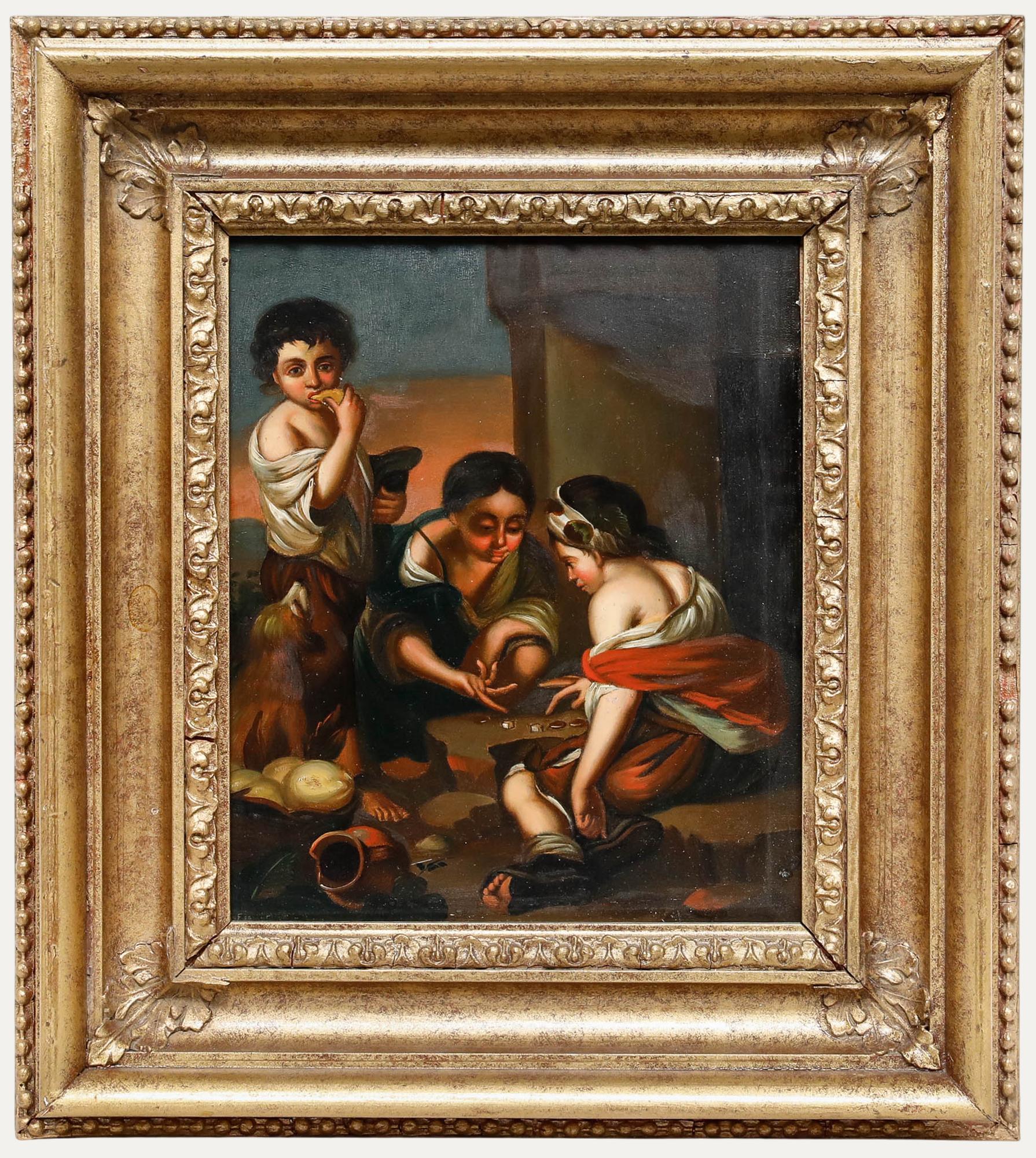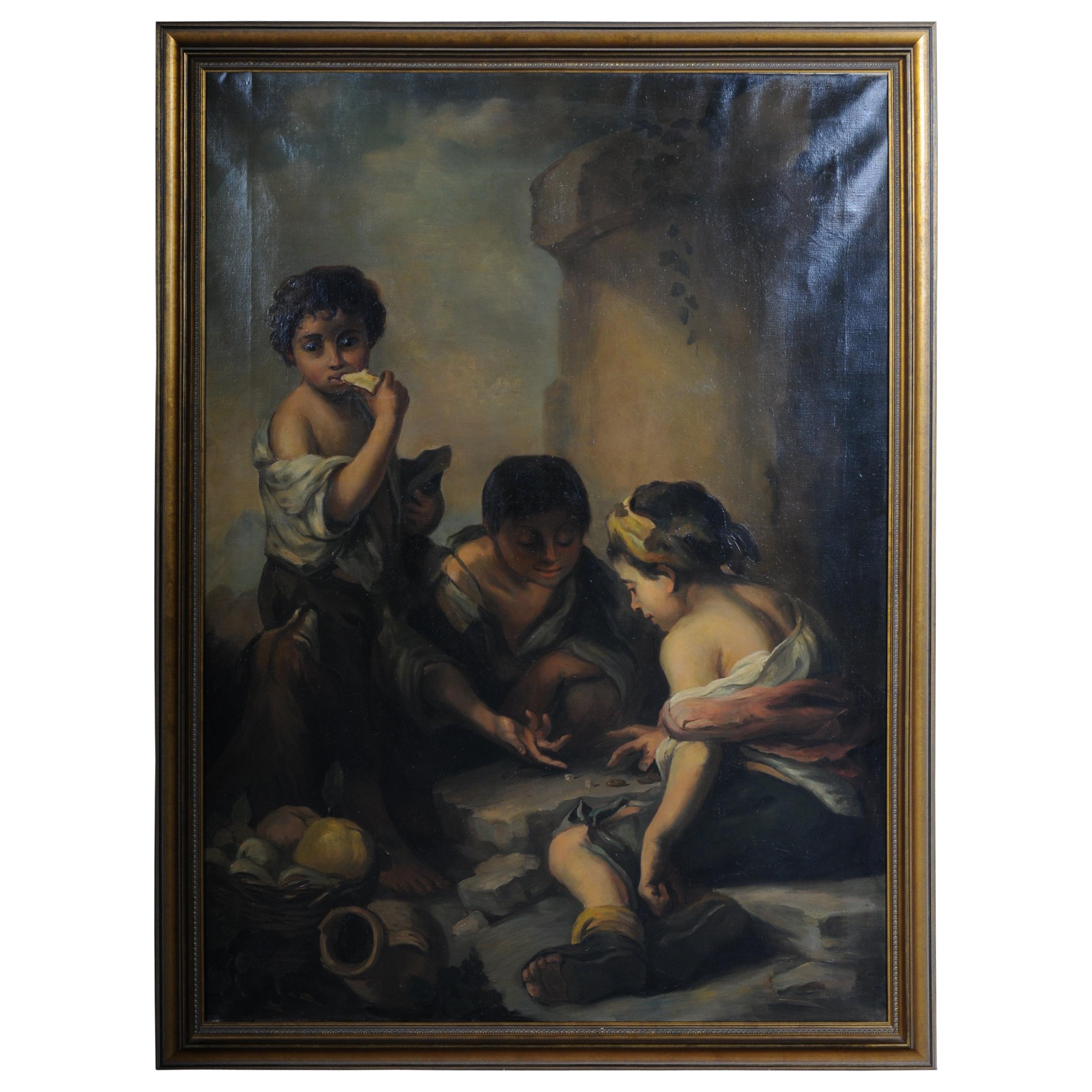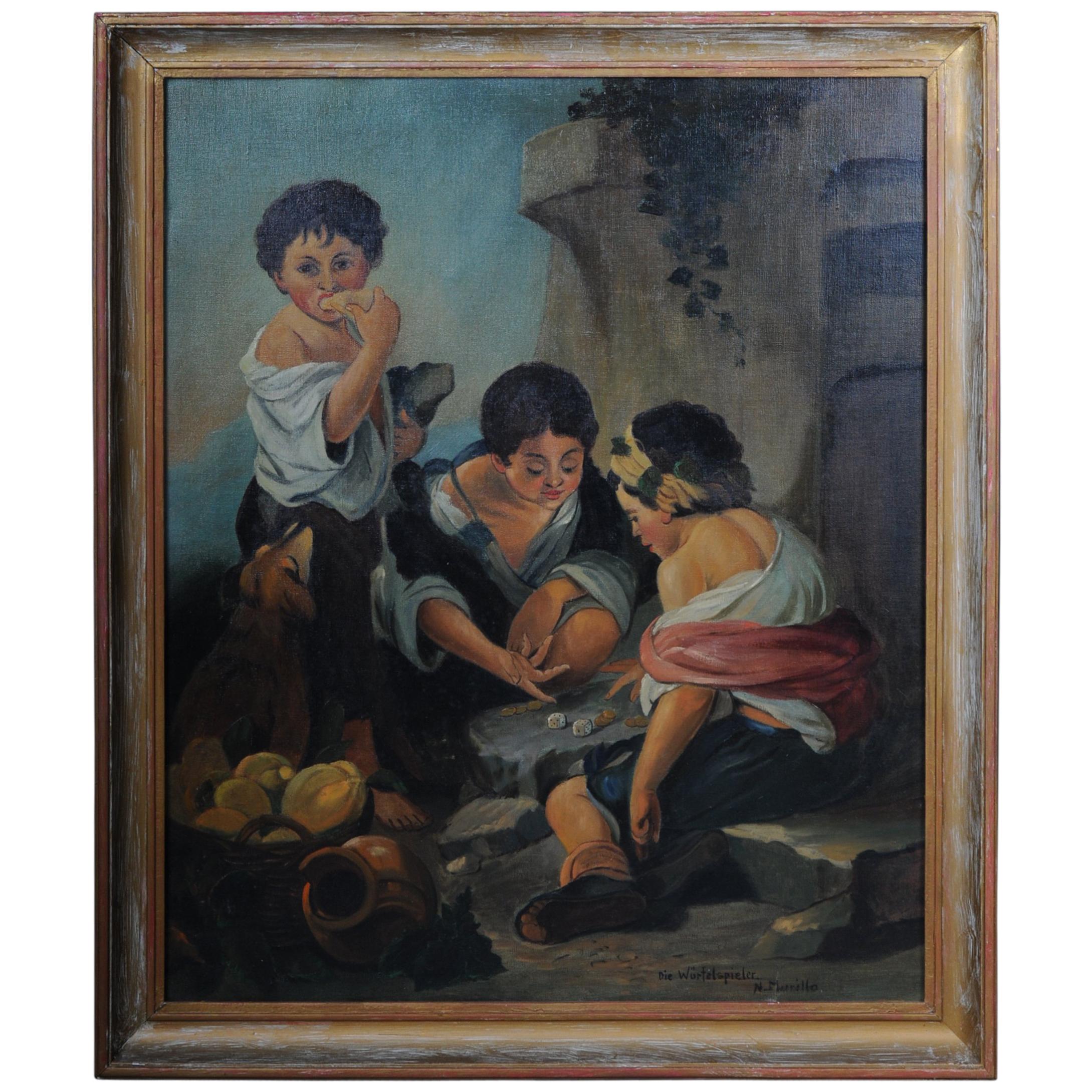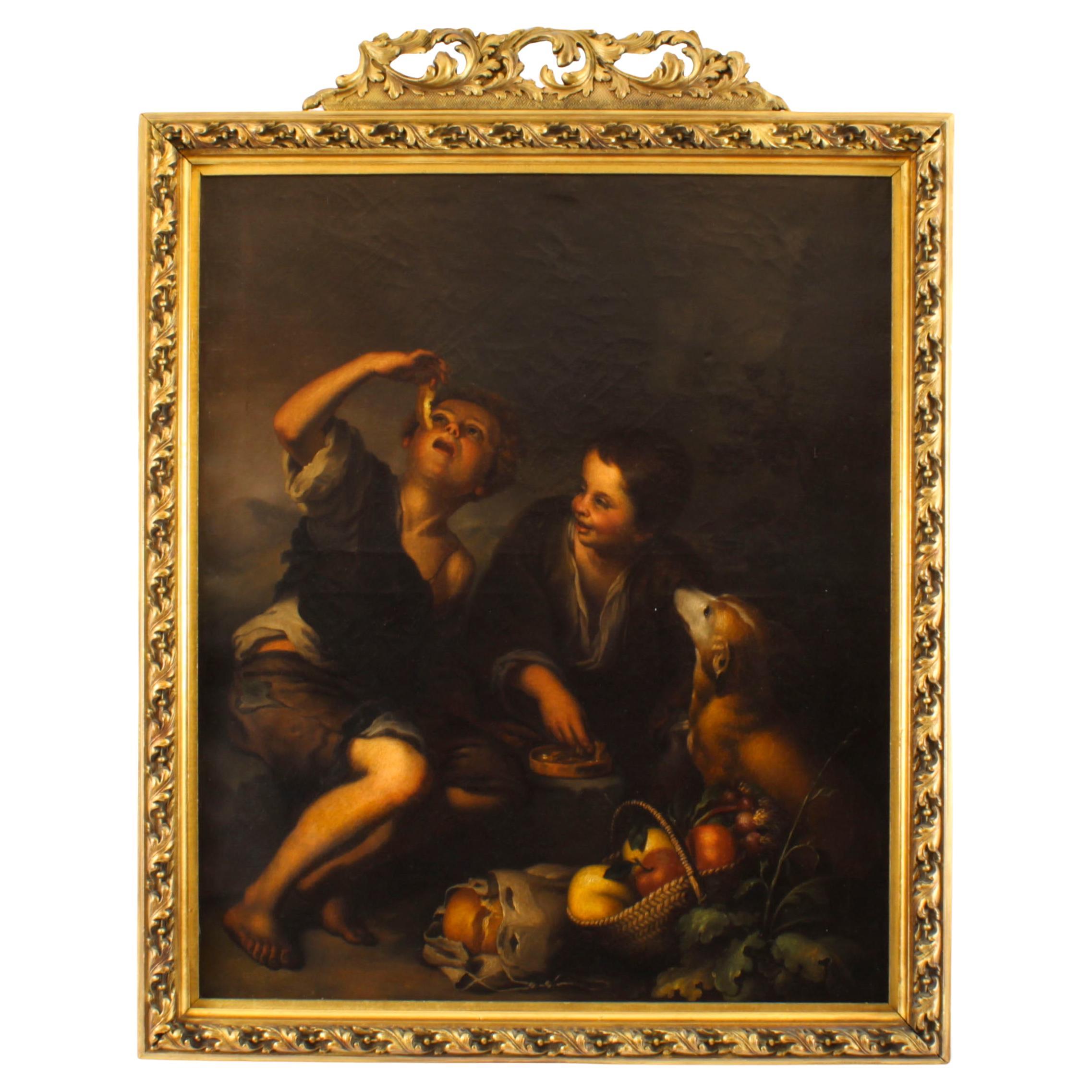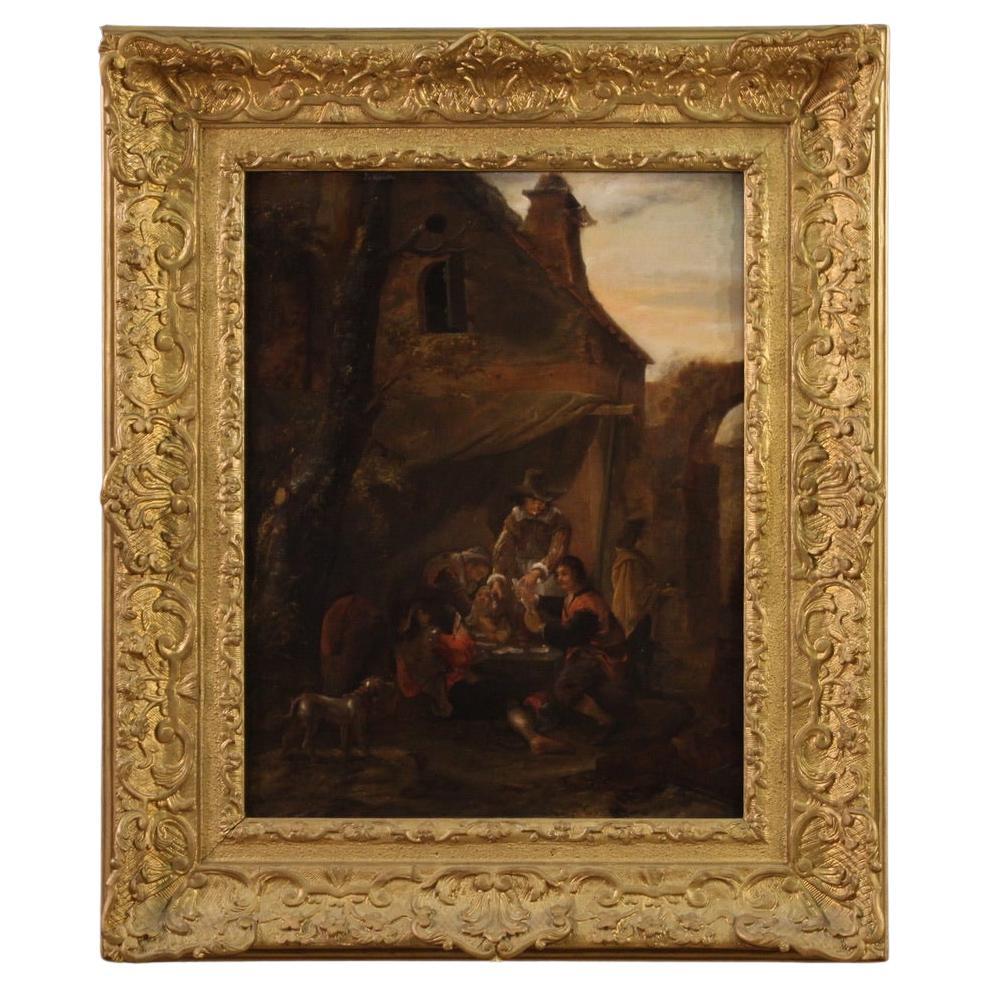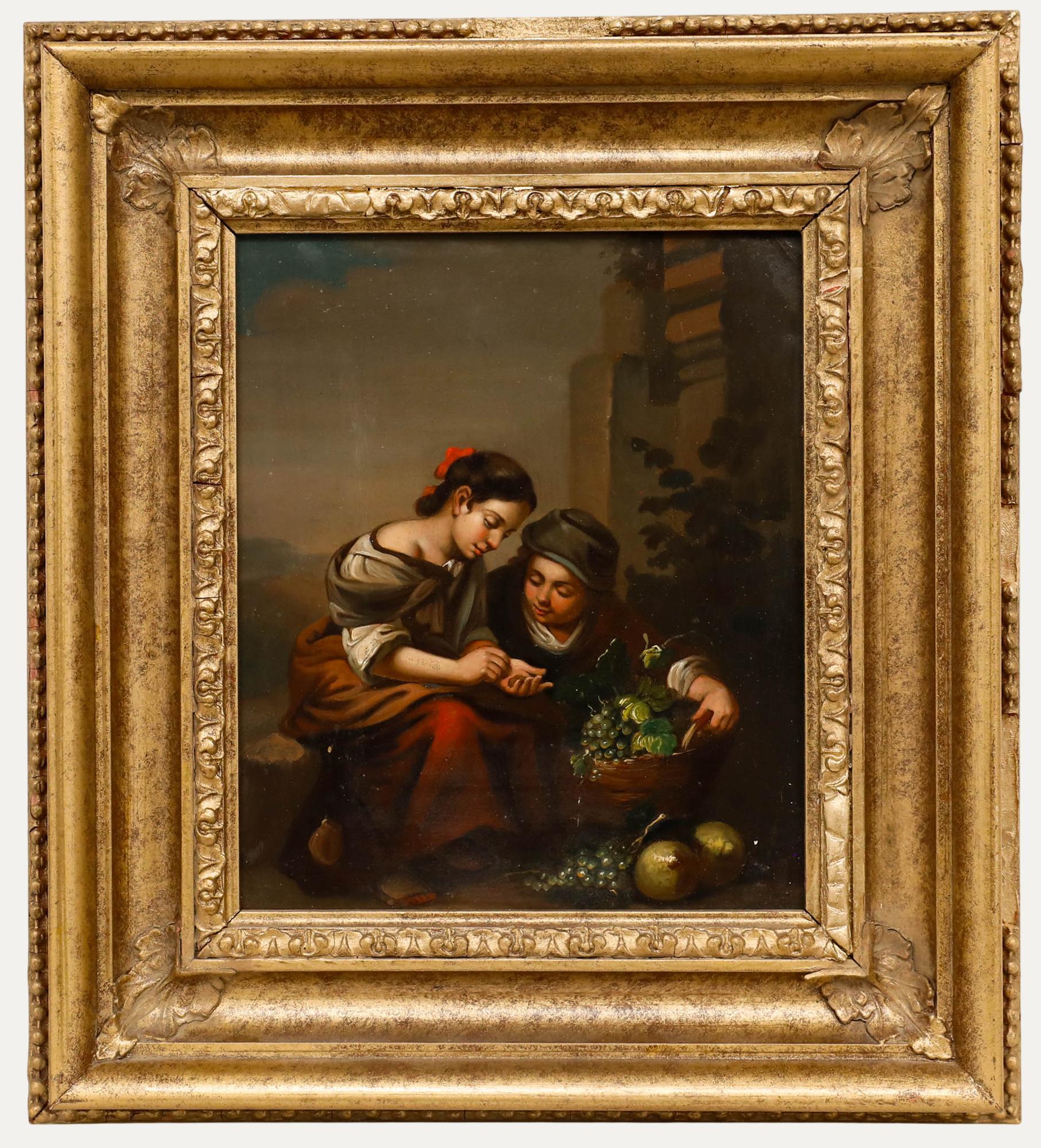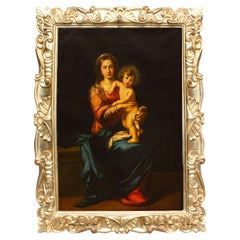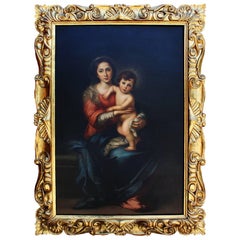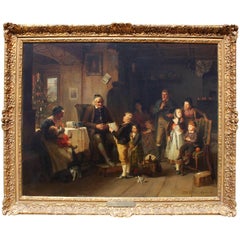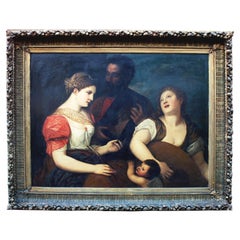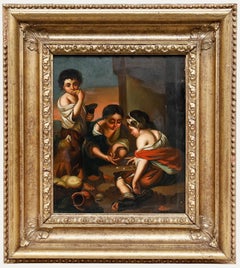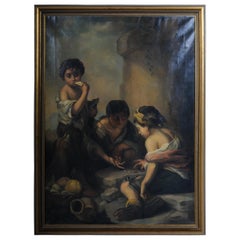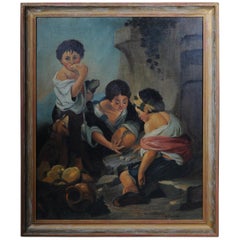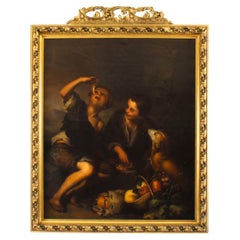Items Similar to Large Oil on Canvas "Beggar Boys Playing Dice" After Bartolomé Esteban Murrillo
Video Loading
Want more images or videos?
Request additional images or videos from the seller
1 of 14
Large Oil on Canvas "Beggar Boys Playing Dice" After Bartolomé Esteban Murrillo
$14,850
$24,95040% Off
£11,215.85
£18,844.1440% Off
€12,962.21
€21,778.2640% Off
CA$20,829.40
CA$34,996.1940% Off
A$23,164.31
A$38,919.1640% Off
CHF 12,125.45
CHF 20,372.3840% Off
MX$282,576.37
MX$474,766.3640% Off
NOK 152,360.64
NOK 255,986.4040% Off
SEK 143,314.86
SEK 240,788.2640% Off
DKK 96,754.49
DKK 162,560.5840% Off
About the Item
A fine and large 19th century oil on canvas after Bartolomé Esteban Murrillo's (Spanish, 1617-1682) "Beggar Boys Playing Dice" (The original work by Murillo was painted in 1675). The impressive artwork depicts two young boys playing dice while another eats a piece of fruit as his dog watches on., within an ornate gildwood and gesso frame bearing a label from the faming company Bigelow & Jordan. The original work by Murillo is currently at the Alte Pinakothek Museum in Munich, Germany. The present work is signed: L. Rüber. Circa: Munich, Late 19th Century.
Bartolomé Esteban Murillo (born late December 1617, baptized January 1, 1618 – April 3, 1682) was a Spanish Baroque painter. Although he is best known for his religious works, Murillo also produced a considerable number of paintings of contemporary women and children. These lively, realist portraits of flower girls, street urchins, and beggars constitute an extensive and appealing record of the everyday life of his times.
Murillo was born to Gaspar Esteban and María Pérez Murillo. He may have been born in Seville or in Pilas, a smaller Andalusian town. It is clear that he was baptized in Seville in 1618, the youngest son in a family of fourteen. His father was a barber and surgeon. His parents died when Murillo was still very young, and the artist was largely brought up by his aunt and uncle.
Murillo began his art studies under Juan del Castillo in Seville. There he became familiar with Flemish painting and the "Treatise on Sacred Images" of Molanus (Ian van der Meulen or Molano). The great commercial importance of Seville at the time ensured that he was subject to influences from other regions. His first works were influenced by Zurbarán, Jusepe de Ribera and Alonzo Cano, and he shared their strongly realist approach. As his painting developed, his more important works evolved towards the polished style that suited the bourgeois and aristocratic tastes of the time, demonstrated especially in his Roman Catholic religious works.
In 1642, at the age of 26, he moved to Madrid, where he most likely became familiar with the work of Velázquez, and would have seen the work of Venetian and Flemish masters in the royal collections; the rich colors and softly modeled forms of his subsequent work suggest these influences. In 1645 he returned to Seville and married Beatriz Cabrera y Villalobos, with whom he eventually had eleven children.
In that year, he painted eleven canvases for the convent of St. Francisco el Grande in Seville. These works depicting the miracles of Franciscan saints vary between the Zurbaránesque tenebrism of the Ecstasy of St Francis and a softly luminous style (as in Death of St Clare) that became typical of Murillo's mature work. According to the art historian Manuela B. Mena Marqués, "in ... the Levitation of St Giles (usually known as the "Angel’s Kitchen", Paris, Louvre) and the Death of St Clare (Dresden, Gemäldegal. Alte Meister), the characteristic elements of Murillo’s work are already evident: the elegance and beauty of the female figures and the angels, the realism of the still-life details and the fusion of reality with the spiritual world, which is extraordinarily well developed in some of the compositions."
Also completed c. 1645 was the first of Murillo's many paintings of children, The Young Beggar (Musée du Louvre), in which the influence of Velázquez is apparent. Following the completion of a pair of pictures for the Seville Cathedral, he began to specialize in the themes that brought him his greatest successes: the Virgin and Child and the Immaculate Conception.
After another period in Madrid, from 1658 to 1660, he returned to Seville. Here he was one of the founders of the Academia de Bellas Artes (Academy of Art), sharing its direction, in 1660, with the architect Francisco Herrera the Younger. This was his period of greatest activity, and he received numerous important commissions, among them the altarpieces for the Augustinian monastery, the paintings for Santa María la Blanca (completed in 1665), and others. He died in Seville in 1682 at the age of 64.
Murillo had many pupils and followers. The prolific imitation of his paintings ensured his reputation in Spain and fame throughout Europe, and prior to the 19th century his work was more widely known than that of any other Spanish artist. Artists influenced by his style included Gainsborough and Greuze.
The Museo del Prado in Madrid; Hermitage Museum in Saint Petersburg, Russia; and the Wallace Collection in London are among the museums holding works by Murillo. His painting Christ on the Cross is at the Timken Museum of Art in San Diego. Christ After the Flagellation is at the Krannert Art Museum, Champaign, Illinois. His work is also found at the Mabee-Gerrer Museum of Art in Shawnee, Oklahoma, and at the Meadows Museum at Southern Methodist University in Dallas, Texas.
Merasures: Canvas height: 53 1/2 inches (135.9 cm)
Canvas width: 39 5/8 inches (100.7 cm)
Frame height: 69 inches (175.3 cm)
Frame width: 55 inches (139.7 cm)
Frame depth: 5 3/4 inches (14.6 cm).
- Similar to:Bartolomé Esteban Murillo (Artist)
- Dimensions:Height: 69 in (175.26 cm)Width: 55 in (139.7 cm)Depth: 5.75 in (14.61 cm)
- Style:Baroque (In the Style Of)
- Materials and Techniques:
- Place of Origin:
- Period:
- Date of Manufacture:circa Late 19th Century
- Condition:Repaired: Minor in paint touch ups. Wear consistent with age and use. Minor losses. Minor fading. An impressive painting. Some spotting, minor losses and touch-ups on canvas which will benefit from a professional cleaning.
- Seller Location:Los Angeles, CA
- Reference Number:Seller: Ref.: A20091stDibs: LU1796210944221
About the Seller
5.0
Vetted Professional Seller
Every seller passes strict standards for authenticity and reliability
Established in 1982
1stDibs seller since 2016
135 sales on 1stDibs
Typical response time: 1 hour
- ShippingRetrieving quote...Shipping from: Los Angeles, CA
- Return Policy
Authenticity Guarantee
In the unlikely event there’s an issue with an item’s authenticity, contact us within 1 year for a full refund. DetailsMoney-Back Guarantee
If your item is not as described, is damaged in transit, or does not arrive, contact us within 7 days for a full refund. Details24-Hour Cancellation
You have a 24-hour grace period in which to reconsider your purchase, with no questions asked.Vetted Professional Sellers
Our world-class sellers must adhere to strict standards for service and quality, maintaining the integrity of our listings.Price-Match Guarantee
If you find that a seller listed the same item for a lower price elsewhere, we’ll match it.Trusted Global Delivery
Our best-in-class carrier network provides specialized shipping options worldwide, including custom delivery.More From This Seller
View AllLarge & Impressive Oil on Canvas "Madonna & Child" After Murillo - V. Bianchini
By Bartolomé Esteban Murillo
Located in Los Angeles, CA
A Large and Impressive Early 20th Century Oil on Canvas "Madonna and Child" After Bartolomé Esteban Murillo (Spanish, 1618-1682) depicting a seated Virgin Mary with a baby Jesus Chri...
Category
Vintage 1910s Italian Baroque Paintings
Materials
Canvas, Giltwood
Attributed to Giorgio Lucchesi, Oil on Canvas "Madonna & Child" After Murillo
By Bartolomé Esteban Murillo
Located in Los Angeles, CA
Attributed to Giorgio Lucchesi (1855-1941) A large and impressive early 20th century oil on canvas "Madonna and Child" after Bartolomé Esteban Murillo...
Category
Vintage 1910s Italian Baroque Paintings
Materials
Canvas, Giltwood
Friedrich Ortlieb Oil on Canvas Children Celebrate Christmas
By Friedrich Ortlieb
Located in Los Angeles, CA
Friedrich Ortlieb (German, 1839-1909) A fine and large oil on canvas titled "New Year's Day at The grandfather's". The joyful indoor family scene depicting a Christmas and new year's celebration with an elder seated couple, the grandparents, the grandmother holding a toddler on her arms, the grandfather with his smoking pipe by his side, both enjoying a young boy's (grandson) poem recital, while other children await their turn with gifts as the mesmerized young parents Stand and watch in awe. A Christmas tree by the window, a cat sneaking by and a basket with wine and bread awaits being delivered as a gift to the elders. A young boy sits patiently on a chair, an apple and an umbrella by his side. Signed: Fried Ortlieb, München 1873 - (lower right). An engraved brass plaque reads "New Year's at the grandfathers - Friederich Ortlieb 1839-1909) Munich, circa 1873.
Friedrich Ortlieb was an accomplished artist, born in Stuttgart in 1839 and died in Munich on the 4th October 1909. He received his formal art training at the L’Ecole des Beaux-Arts in Stuttgart and also at Steffeck, Berlin. He exhibited widely, though most notably in Dresden and Vienna from 1871. He is best remembered for his genre scenes with children as shown in this finely detailed example of his work. Epitomizing the very best in this genre, Ortlieb depicts the character and personality of the children in joyful situations with accuracy and great sensitivity to the subject matter, a frozen moment in time with so much detail and emotion expressed in the children’s and elder's faces.
Related literature:
E. Benezit, Dictionnaire des Peintres, Sculpteurs, Dessinateurs et Graveurs by Gründ, Volume 8, Page 41
Provenance:
Grogan & Company, Dedham, December 5, 1999 - Sale No. 81, Lot 13
Gallerie in Paris, 2000
Christie's New York 2003
Paris art gallery...
Category
Antique 19th Century German Country Paintings
Materials
Giltwood, Canvas
"An Allegory of Love" 19th C. Oil on Canvas After Titian - Tiziano Vecellio
Located in Los Angeles, CA
A Large and Impressive 19th Century Continental Oil on Canvas "An Allegory of Love" after the original work by Titian - Tiziano Vecellio (Italian 1488-1576), within an ornate gilt-wo...
Category
Antique 19th Century Italian Baroque Paintings
Materials
Canvas
$9,960 Sale Price
20% Off
Italian 18th Century Oil on Canvas "Madonna and Child" after Giovanni Lanfranco
By Giovanni Lanfranco
Located in Los Angeles, CA
A very fine Italian 18th century oil on canvas "Madonna and Child" after Giovanni Lanfranco (Italian, 1582-1647). The young Virgin Mary attending to...
Category
Antique 18th Century Italian Baroque Paintings
Materials
Canvas, Giltwood
$19,850 Sale Price
39% Off
Italian 19th Century Oil on Canvas "The Music Professor" Carlo Sassi
By Carlo Sassi
Located in Los Angeles, CA
Italian 19th century oil on canvas titled "The Music Professor" depicting a mid-19th century music-room scene of an elder man, the music professor, holding his violin, hat and umbrel...
Category
Antique 19th Century Italian Other Paintings
Materials
Gesso, Canvas, Wood
$9,960 Sale Price
20% Off
You May Also Like
After Bartolomé Esteban Murillo (1617–1682) - Oil, Beggar Boys Playing Dice
Located in Corsham, GB
A charming 19th century oil after Bartolomé Esteban Murillo (1617–1682) depicting little beggar boys playing dice. To the left, one of the boys stares directly at a viewer, whilst a ...
Category
19th Century Figurative Paintings
Materials
Oil
Great Painting Grapes and Melon Eaters After Esteban Murillo Oil of Canvas
By Bartolomé Esteban Murillo
Located in Berlin, DE
The picture shows two about ten-year-old street boys eating fruit. The environment is not further defined. With obvious pleasure, the left street boy is eating a grape while the righ...
Category
20th Century European Paintings
Materials
Canvas
Oil Painting Gibbet Dice Player after Murillo
Located in Berlin, DE
Oil of canvas
Hand painted
to Murillo
dice player.
(S - 201)
Gemälde.
Category
20th Century Paintings
Antique Painting Grape and Melon Eaters After Bartolome' Murillo 18th Century
By Bartolomé Esteban Murillo
Located in London, GB
This is a delightful antique Spanish oil on canvas painting after Bartolome' Esteban Murillo, depicting two peasant boys eating grapes and melon, Circa 1780 in date.
It features a ...
Category
Antique Late 18th Century Spanish Baroque Paintings
Materials
Canvas
18th Century Oil on Panel Flemish Antique Painting Card Players, 1750
Located in Vicoforte, Piedmont
Flemish school of the 18th century. Oil on panel artwork depicting card players sitting at an outdoor table, probably next to an inn. The innkeeper, depicted standing while offering ...
Category
Antique 1750s Dutch Paintings
Materials
Wood
After Bartolome Esteban Murrillo - 20th Century Oil, The Little Fruit Seller
Located in Corsham, GB
This fine painting is a reproduction of Bartolomé Esteban Murillo's work, portraying young girls selling a basket of fruit. The scene is set against a classical background, showcasin...
Category
20th Century Figurative Paintings
Materials
Oil
More Ways To Browse
Antique Catholic Painting
German Wood Carved Figures
Barber Sign
German Watch Company
Pair Of Still Life Fruit
Catholic Wood Carved
Cathedral Model
Large Dice
Large 19th Century Dog Painting
Dior Watches Women
German Texas
19th Century Virgin Oil Paintings
Immaculate Conception
Roman Dog
Russian Paintings Of Saints
Antique Russian Watches
Bartolome Esteban Murillo
After Murillo Painting
